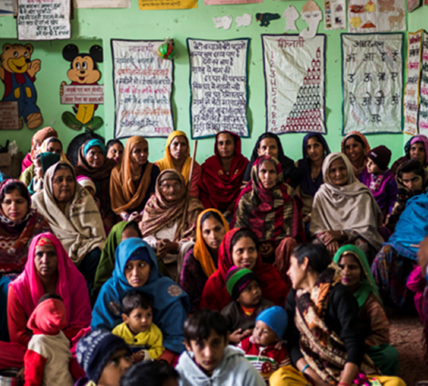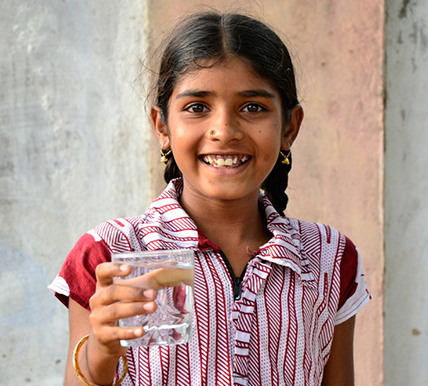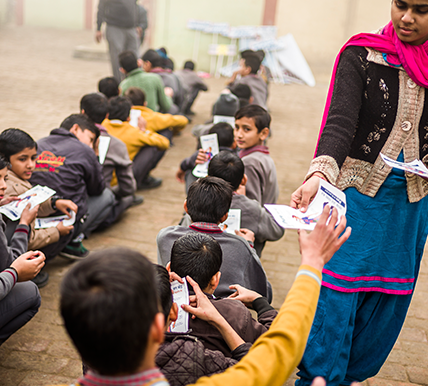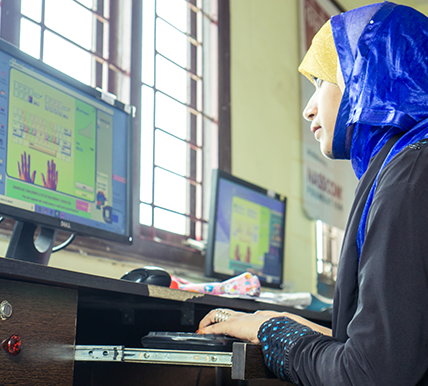JOIN THE CAUSE
Let’s Unite for Hydration
Scope: 30-50 Community Water Centres
Water contamination that arises due to geogenic nature has the tendency of being spread in the nearby contiguous areas. Realising this Naandi Water many times operates at a district level to make critical impact. We take into account the views, concerns and needs of the District Development Authorities (Like PHED, ZPTC, RWS engineers, etc.), share our drinking water model and plan with them and then go ahead solving for the water problem in that district in a quick, decentralised way.
In the past experience of Naandi Water – we have operated in Mahendragarh and Jhajjar districts from Haryana, Kolhapur from Maharashtra and Jaipur rural district in Rajasthan in this modus operandi and the scope of the project ranged from 30 to 50 community water centres per district.
Scope: 5-10 Community Water Centres
The image that mostly blinks in our mind when it comes to underserved for drinking water is the rural habitations in our country. As field practitioners of providing safe water in 696+ communities, what we understood is the urban slums, the peri urban zones and the newly formed Municipalities that are just transitioning from villages to towns equally need a safe water intervention with immediate effect.
By sponsoring a cluster, you will help people in the margins of the city/ town along with the rural habitations that dot this newly emerging towns. Areas like Kaithal in Haryana, Kalher in Bhiwandi, Harohalli in Karanataka are some of the examples we have developed in the cluster approach
Scope: 1-3 Community water Centres
Gram Panchayats along with their habitations that are suffering from water contamination will be selected for this intervention. Depending on the population, the distance to be travelled from the main village to the habitations or Dhaanis, anything between 1-3 water centres are set up in a village
Scope: 50-250 children studying in Government institutions
Children are the future of the country and many time unfortunately despite being mandated as a child right and an article of right to education, many government schools and anganwadis suffer without access to safe drinking water. At Rs.350/- per annum – that is less than Rs.1/- per day you can impact the health and continues learning of a child.
Scope: 30-50 Community Water Centres
Water contamination that arises due to geogenic nature has the tendency of being spread in the nearby contiguous areas. Realising this Naandi Water many times operates at a district level to make critical impact. We take into account the views, concerns and needs of the District Development Authorities (Like PHED, ZPTC, RWS engineers, etc.), share our drinking water model and plan with them and then go ahead solving for the water problem in that district in a quick, decentralised way.
In the past experience of Naandi Water – we have operated in Mahendragarh and Jhajjar districts from Haryana, Kolhapur from Maharashtra and Jaipur rural district in Rajasthan in this modus operandi and the scope of the project ranged from 30 to 50 community water centres per district.
Scope: 5-10 Community Water Centres
The image that mostly blinks in our mind when it comes to underserved for drinking water is the rural habitations in our country. As field practitioners of providing safe water in 696+ communities, what we understood is the urban slums, the peri urban zones and the newly formed Municipalities that are just transitioning from villages to towns equally need a safe water intervention with immediate effect.
By sponsoring a cluster, you will help people in the margins of the city/ town along with the rural habitations that dot this newly emerging towns. Areas like Kaithal in Haryana, Kalher in Bhiwandi, Harohalli in Karanataka are some of the examples we have developed in the cluster approach
Scope: 1-3 Community water Centres
Gram Panchayats along with their habitations that are suffering from water contamination will be selected for this intervention. Depending on the population, the distance to be travelled from the main village to the habitations or Dhaanis, anything between 1-3 water centres are set up in a village
Scope: 50-250 children studying in Government institutions
Children are the future of the country and many time unfortunately despite being mandated as a child right and an article of right to education, many government schools and anganwadis suffer without access to safe drinking water. At Rs.350/- per annum – that is less than Rs.1/- per day you can impact the health and continues learning of a child.






